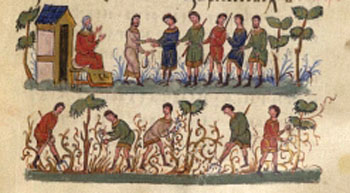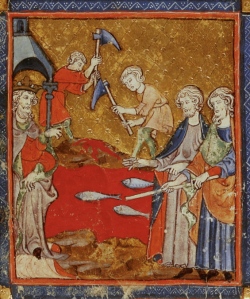Reference: Exodus 21:2-11
Question:
We simply can’t believe that God made the regulations for having slaves. Although we know that these regulations were a big deal at that time, it’s unbelievable for us that God literally said them. Wouldn’t God say that everybody belongs to him instead of to a person?

Could God really have condoned slavery?
Answer:
An entire volume could be dedicated toward the explanation of this topic, but this is a blog, so I will try to keep it brief.
For obvious reasons, it is very difficult for us to justify the issue of slavery as it is presented in several parts of scripture. First of all, the idea of possessing or owning another person is detestable to us, as it should be. The other reason that we find this so difficult is because the primary understanding that our westernized culture has of slavery comes from the history of African slaves and their experience in Europe and the Americas during the 16th through the 19th century. Even today people of African decent still feel the effects of that racist system that was abolished a hundred and fifty years ago. Perhaps the most intriguing issue with slavery in the book of Exodus is the fact that God just rescued his people from slavery in Egypt, so it seems that there is an inherent contradiction within the culture if there is any acceptance of slavery.
In an effort to answer the question above as it pertains specifically to God and slavery, I will approach the question with a mind toward faithful Biblical interpretation. There are 3 angles from which we can better understand slavery in the Bible, cultural context, textual context, and theological context (the latter of which will give the most concise answer concerning God). I will stay away from doing any in depth language or other exegetical work and I will keep this post focused on the Old Testament, as there will likely be future posts on slavery in the New Testament.
The Practice of Slavery in its Cultural Context
As with any difficult issue of interpretation in the bible we must not underestimate the importance of cultural context. It is too complicated an issue to simply say “slavery was accepted in the ancient near east” and then brush it aside. But it is important that we understand that the kind of slavery referred to in the Mosaic Law is a different kind of slavery than the African slavery in U.S. history or the sex slavery that is still so prevalent today. Even when Exodus was written there were different kinds of slavery. There was prisoner of war slavery, in which prisoners became the property of the nation or army that captured them in battle; there was the chattel slavery, in which slaves were captured, sold, and traded as the Israelites had experienced in Egypt (this can be likened to the capture and sale of Africans during the African diaspora). Lastly, there was a kind of slavery called debt slavery, in which individuals or families would submit themselves to temporary or permanent slavery as a means of paying off a debt or taking care of their families. It is the later kind of slavery, debt slavery, to which the laws in Exodus refer.
All forms of slavery are economic in nature. Some though, are more socially balanced than others. When the Israelites were enslaved in Egypt there there was no social balance to speak of. In other words, they were captured and forcefully put to work so that Egypt would have free labor for which the slaves received nothing but cruelty from their masters. Debt slavery however, works much differently. Debt slavery was a part of a social structure that allowed for the poor to care for themselves. Sadly, this was the lot of the poor and destitute in ancient society. For the poor there were few options for them to pay off their debts or earn a wage that would allow them to survive. In such cases they could (by their own free will) submit themselves to a slave/master relationship in which they would work for a certain amount of years (depending on the size of they’re debt) in return for their debt being released or paid for. While this is not an ideal situation, and led to many abuses, there is a clear difference between this kind of slavery and chattel slavery which was explicitly forbidden by God (Exodus 21:16).
In ancient near eastern culture the practice of debt slavery would have been common. What would not have been common were laws designed to protect the slaves, as we see in Exodus 21 and elsewhere. Thus, God was providing a means of protection for people who otherwise would not have had rights at all.
The Practice of Slavery in Its Broader Biblical Context
It is not enough though to acknowledge that slavery was an accepted part of the ancient social structure and then move on. These laws are still difficult to swallow, so we need to understand them in their broader textual context. As we read through the Law of Moses in Exodus through Deuteronomy we need to remember that the Law works much differently then our laws today. Unlike our laws, the laws of Israel did not stand alone, they complemented each other, leaned on each other, and relied on each other. There are 613 different laws from Exodus through Deuteronomy and none of them stands in isolation, they support and sustain the whole (Bruckner).
In other words, if you are going to fully understand the laws on Slavery, you need to understand ALL of the laws together. They cannot stand on their own. For example, we cannot simply read the first few verses of Exodus and assume that all slavery was okay, because later in the same chapter we see that the kidnapping of people and selling of slaves is forbidden (Exodus 21:16). Furthermore, we cannot fully understand the social structure of debt Slavery within the Jewish faith without fully embracing the idea of ‘debt release’ as prescribed in the Law’s teaching on the year of Jubilee (Leviticus 25). The year of Jubilee was an unprecedented time of renewal, redemption, and forgiveness that God prescribed in his law. It took place every fiftieth year. In the verses below you see what represents a radical protection of the poor who otherwise would have been subject to harsh treatment as slaves.
“If one of your fellow Israelites falls into poverty and is forced to sell himself to you, do not treat him as a slave. 40 Treat him instead as a hired worker or as a temporary resident who lives with you, and he will serve you only until the Year of Jubilee… 42 The people of Israel are my servants, whom I brought out of the land of Egypt, so they must never be sold as slaves. 43 Show your fear of God by not treating them harshly.” Leviticus 25:39-43
The astute observer would note that the next verses in Leviticus state that for the foreigner it is okay to purchase them as slaves and treat them as property (Leviticus 25:44-46). These words seem hard, yes, but we must not forget the many laws that protect and advocate for the foreigner, as well as the foreign slave. God reminds the Israelites often that they too, “were aliens in Egypt” (Exodus 22:21).
The Practice of Slavery in the Broader Theological Context
Ultimately, the question that we need to wrestle with here is ‘how could God allow for this within the community of his people?’ God is not advocating for slavery in these passages. God abhors the inequality that exists in our world . No human can belong to another because we all belong to God (Psalm 24:1). But we must not forget that the laws that God provides in Exodus are for a broken society living in a broken world. The system of slavery (be it debt slavery or chattel slavery) is a powerful reminder of that brokenness. The Law does not bring redemption of that brokenness, only Jesus Christ can do that. Thus, when God gave Law and regulations concerning slavery, that did not constitute an acceptance of that broken system, it was more like a bandage given to his people to help protect those who were marginalized in society. At the end of the day though, salvation and redemption do not come through the Law, but through Christ (Galatians 2:16)







